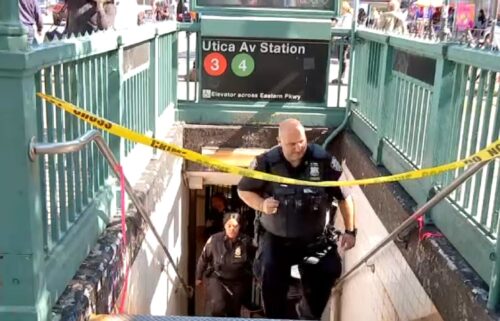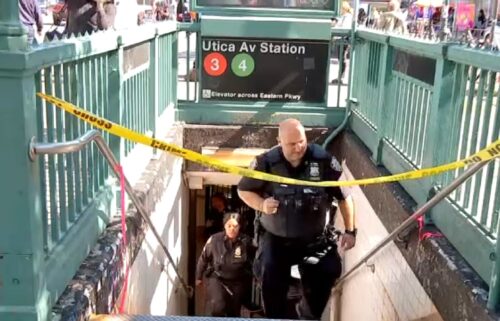‘Truthfully, only a fool would stay.’ Floridians head inland as Hurricane Milton’s fury nears
By Paul P. Murphy and Michelle Krupa, CNN
Anna Maria Island, Florida (CNN) — Carol Whitmore couldn’t pack her big SUV to leave this barrier island as Hurricane Milton aimed Tuesday for Florida’s west coast with already-historic fury.
Hurricane Helene took it two weeks ago.
“Up to the door panels” the surge crashed in from that killer storm, which plowed ashore nowhere even close to here – but some 200 miles to the north – she said.
Still, for a while in Helene, Whitmore was cut off. Then, her daughter found her on the family safety app Life360, she said, before “some kids that I’ve known since they were little picked me up” in a boat.
This Tuesday morning – some 40 hours before Milton’s forecast landfall – the longtime Manatee County public official was not ignoring her recent lesson. Whitmore would not risk it again. In her other vehicle, she would head to Orlando, important papers from her safety deposit box and “enough clothes for a while” in tow.
“Everything I have right now is in my car, and I had to make room for my dog … Maddie, a little rescue,” she said.
“Truthfully, only a fool would stay,” Whitmore added, calling Milton, “the one we always prepared for – but never had.”
Like millions across Florida, Whitmore was all-in Tuesday on her plan for weathering a massive and powerful hurricane growing broader and stronger by the hour as it threatened to use untold tons of yet-uncollected Helene debris as a missile depot while terrorizing a weary public with predicted record storm surge and wind.
In just the past day, statewide warnings had echoed as Milton, flirting in the warm Gulf of Mexico with Category 5 intensity, aimed at a swath of Florida almost as long as the Peninsula itself. The mayor of nearby Tampa had issued a dire alert: “If you choose to stay in one of those evacuation areas,” Jane Castor said, “you’re gonna die.”
On this island of world-class seashores, Holmes Beach’s police chief on Tuesday echoed the admonition: “If you don’t take heed, you’re on your own,” Bill Tokajer said. “You might as well take a Sharpie and write your name and Social Security number on your leg so that when we find you, we have a contact …
“Because you staying out here is not going to work,” he said. “It is not going to be good for you.”
Elsewhere across Florida, residents on Tuesday packed bridges and byways, state highways and interstates to flee coasts with storm surge of up to 15 feet predicted. Behind the wheel on Interstate 4, Jake Keglor had put his home in Seminole, near St. Petersburg, in the rear view by Tuesday at 9 a.m.
But soon, he had a new problem.
‘There’s a lot of roads that are a war zone’
“Gas is the biggest issue,” Keglor said. With his 14-year-old gray tabby cat Sugs, he navigated the 100-mile trek northeast to Orlando the day after his parents spent eight hours in evacuation gridlock. “All of the pumps have the bags on them” because they’re empty.
As for traffic, it also was “not great,” he said, even with “all the shoulder lanes … open.”
Usually with a hurricane headed his way, Keglor would stay put: 3 miles from the coast, in evacuation Zone C. But last month’s deadly hurricane had upended his usual thinking, too.
“Two weeks ago, with Helene, I had never seen the stuff that we saw,” Keglor said. Friends who’d at first been blase on social media about the storm suddenly were “not so chill anymore: Their car’s halfway underwater.”
Since then, crews across Florida have been on a mad dash to clear mountains of debris – doors, mattresses, ottomans and couches, refrigerators and side tables, even an honor roll memento earned by someone named Angel – still left from Helene before Milton can use them as ammunition.
“We’ve been out here for the last 48 hours doing everything we can to help clean these streets up,” said Greg Mullis, manager of corporate operations for College H.U.N.K.S. junk-hauling firm, while at work Tuesday in the Gandy community of Pinellas County south of Tampa.
“There’s a lot of roads that are a war zone.”
“We’ve been running nonstop since Sunday to help with just the curbside pickup to just eliminate damage that’s, you know, ultimately unnecessary at this point,” said his colleague, Dan Whelan, the company’s vice president of operations.
‘Just taking our last sentimental walk’
Marie Saveikis, 82 years young, had wanted to stay in her coastal home during Milton, she said. But her children and grandchildren insisted she evacuate to Belleair Bluffs south of Clearwater, which she’ll do – but not before she gets ready.
“Last night, I took a shower before I went to bed,” said the native Pittsburgher who raised four kids as a single mom and ran a hair salon. “I’m gonna take another one soon as I go wash my hair, put no product in it, so then I can just take my little bag and go over to my son-in-law’s in the morning.
“For me, it’s toiletries and medications,” she continued. “And clean clothes because I’m a clean freak … I don’t care about my makeup, I don’t care about my hair; I just need to be clean.”
Back on Anna Maria Island, Montana snowbirds Skip and Annie Radick walked their dog, Skip, early Tuesday afternoon along the flattened sand and strewn dune grasses that, until Helene, had stood stalwart against storm surge.
“We were just taking our last sentimental walk, … and taking a couple pictures, and we’re heading inland,” said Skip. “We’ve been in and on the island since 1997 and, yeah: First time we’ve seen nobody on the beach – first time.”
The couple planned to evacuate in a few hours. In a few days, Annie said, “I don’t think we’ll have a house left.”
“It’s sad, obviously, because we, our kids and grandkids, for 12 years have been coming here,” Skip said. “It’s part of their growing-up, right? And probably not going to be here anymore. So, it is what it is. A lot of people going through a lot worse.”
As the landfall hour approached, Tokajer – the Holmes Beach police chief – was “juggling.”
“There’s no other word for it,” he said. “We’re still working on Helene, and at the same time, we’re working on Milton. So, we’re trying to get everybody out from Milton, and we’re trying to get all the debris up from Helene …
“And if you have not evacuated, bug out by tonight. You’ve got to get out of here,” he said. “This looks like, so far, the word is that it’s going to be double the surge of Helene. If we have double the surge of Helene, the water will be over my head out here. We won’t be here.
“It’s going to be surreal.”
Earlier on Interstate 4 with his tabby cat, Keglor had considered his own rare evacuation, which in some ways mirrored the unusual nature of Milton for Florida’s central west coast: “If the storm stays on the current track, it will be the worst storm to impact the Tampa area in over 100 years,” the National Weather Service in the city warned Monday.
“Statistically, I guess we haven’t really been hit directly in 100 years, and this seems to be it,” Keglor said.
Then, as he crept along the highway – and Milton churned in the Gulf – Keglor’s mind went to a bit of lore he’d picked up during his years living in Seminole.
“It’s like the Tocobaga tribe that put a blessing on the Tampa Bay area that warded off storms,” he explained.
“And it just feels like it might be time to reup that blessing.”
CNN’s Paul P. Murphy reported from Florida’s west coast, and Michelle Krupa wrote from Atlanta; Leigh Waldman in Tampa contributed to this report.
The-CNN-Wire
™ & © 2024 Cable News Network, Inc., a Warner Bros. Discovery Company. All rights reserved.



